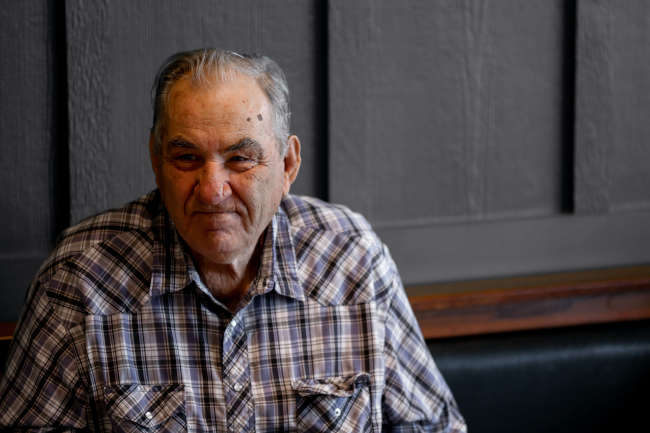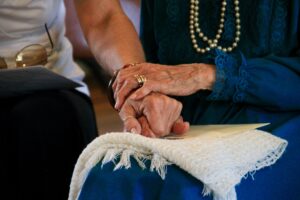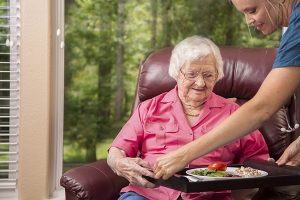
As your loved one’s dementia progresses, there may come a time when you need to consider 24-hour home care for dementia patients.
24-hour elderly care is an excellent service offered by home care companies that benefit aging adults and family caregivers by:
- Providing aging adults with around-the-clock assistance in their home
- Relieving family caregiver burdens, worries, and stress
However, many family caregivers may not know when their loved one needs 24-hour dementia care at home.
Are you a family caregiver wondering, “When do dementia patients need 24-hour care?”
In this article, we’re sharing expert insight into home care for the elderly in their own homes, especially 24-hour in-home dementia care. Additionally, you’ll learn some of the signs that signal your loved one could benefit from 24-hour care.
Keep reading to get more information about how to get 24-hour home care for your loved one today.
What Is 24-hour Care in Your Own Home?
24-hour elderly care provides aging seniors with a trained caregiver who’s ready and available to help them at any hour of the day.
These full-time home caregivers look after elderly adults in the comfort of the clients’ homes. Unlike live-in caregivers, 24-hour caregivers aren’t allowed to sleep during their 8- or 12-hour shift. A 24-hour caregiver’s inability to sleep during their shift ensures that the client always has professional help readily available.
A spouse or adult child may be able to provide initial care for their loved one with dementia. However, someone with dementia may eventually require more regular, hands-on assistance than a family member can provide.
When dementia starts to affect a person’s personality, behavior, and motor function, 24-hour dementia care at home can provide the care your loved one needs.
But when exactly do dementia patients need 24-hour care?
That’s a great question, and we’ll answer it in the next section.
4 Reasons Your Loved One May Need 24-hour Elderly Care
Dementia progression will be different for each person suffering from it. Some individuals may live independently with dementia for years, while others will need more serious care after a few months.
Regardless of your loved one’s rate of progression, there are specific symptoms that individuals with dementia will exhibit that signal a need for greater care.
Here are four symptoms that may require you to consider 24-hour elderly care for your loved one with dementia.
1. Wandering
Wandering is a common symptom of dementia. And not only will people with dementia wander, but they’re also prone to confusion, forgetfulness, and getting lost.
There are some ways to dementia-proof your home, and many elderly monitoring devices exist to aid in keeping an eye on mom or dad. However, wandering and confusion are common occurrences during the day and night for those with dementia.
24-hour care in your own home is one of the best ways to ensure your loved one doesn’t wander too far. With a caregiver watching your loved one at all hours of the day, your loved one will always have someone who can:
- Keep them from wandering and getting lost
- Calm them down if they get confused about their surroundings
- Make sure doors and exits are locked during the night
24-hour home care for the elderly in their own homes provides your loved one with direct supervision during the day and night.
2. Sleeplessness
Sleeplessness is another dementia symptom that may lead you to consider 24-hour care for dementia patients.
Because people with dementia often can’t sleep at night, it requires that someone be awake to care for them by:
- Keeping them company
- Assisting them in moving around the house
- Calming them down if they get confused
- Making sure they don’t wander
Once daytime comes, they’ll still need someone awake and alert during the day to assist them.
In addition, sleeplessness at night can lead individuals with dementia to take naps during the day. Napping isn’t harmful, but it’s advised that naps be scheduled for the same time each day and are kept to a minimum. Scheduling naptime and only taking a few naps can help someone with dementia sleep better at night.
Handling caregiver duties all day and night can be exhausting for a family member. 24-hour dementia care at home can provide trained caregivers to look after your loved one during the day and night.
3. Incontinence
Incontinence is another issue that may result in a need for 24-hour care in your own home as an elderly adult with dementia.
Most individuals develop incontinence in the middle to late stages of dementia. An inability to make it to the bathroom could be the result of:
- A medical condition (i.e., urinary tract infection)
- Lack of adequate mobility
- Difficulty finding the bathroom or remembering where it is
- Medication or dietary side effects
Regardless of the root cause, incontinence is an uncomfortable and embarrassing condition.
Having someone available 24/7 to monitor and aid your loved one can help ease the discomfort of incontinence.
4. Loss of Motor Function
Lastly, the later stages of dementia can bring about a significant loss of motor function.
As your loved one loses more of their motor functions, they’ll need an increasing level of hands-on care. Motor function loss can impair your loved one’s ability to:
- Get in and out of bed
- Safely move around the house (or move at all)
- Eat or drink
- Bathe and dress
At this stage, your loved one will truly need someone else to help them and look after them at all hours of the day. 24-hour dementia care at home is the best way to ensure your loved one receives the best quality of life as their motor function is impaired.
24-hour Home Care for the Elderly in Their Own Homes
Dementia is a progressive disease that gets worse over time. In the early stages of dementia, family caregivers may handle a bulk of the caregiving duties. But as dementia symptoms increase in severity, family caregivers may need some professional help caring for their loved ones.
Fortunately, many home care companies provide 24-hour home care for dementia patients. These in-home caregivers enter your loved one’s place of residence and assist them with life tasks throughout the day and night. Thus, 24-hour elderly caregivers provide high-quality care to your loved one and relieve you of the caregiver burden.
If you have a loved one with dementia and you’re wondering, “When do dementia patients need 24-hour care?” you can look for any or all of these four symptoms:
- Wandering
- Sleeplessness
- Incontinence
- Loss of motor function
Taking care of a loved one with dementia is challenging, but you don’t have to do it alone.
At Stowell Associates, we’re passionate about in-home dementia care. Our goal is to:
- Provide exceptional home care to elderly adults
- Relieve family caregivers of the stress of caregiving
Care Managers work with you and your family to create a care plan specific to your loved one’s needs. Then, our highly-trained caregivers enter your loved one’s home and put the plan into action. The result is an exceptional level of care that provides a greater quality of life to you and your aging loved ones.
Are you interested in learning more about 24-hour dementia care at home?













